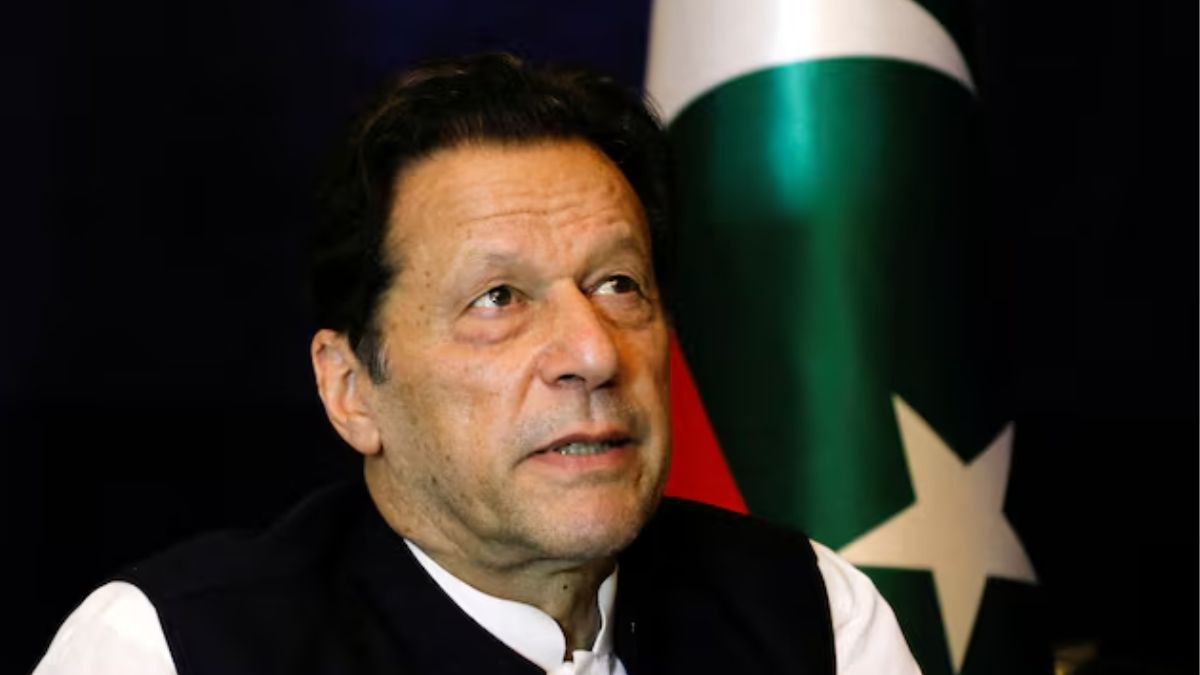The army, which has ruled Pakistan for more than half its 76-year independent history, plays an oversized role in the politics and governance of the nation. The army has played a crucial role in Khan’s life over the past decade. Analysts widely believe his initial close ties with the military establishment were instrumental in his ascent to power. read more
)
Imran Khan- File Photo- Reuters
Imran Khan, Pakistan’s jailed former prime minister, who blames the military for his ouster and 12-month-old imprisonment, said that maintaining “excellent” relations with the military is crucial, despite blaming them for his removal from power and incarceration on charges he claims are fabricated.
Ahead of the first anniversary of his imprisonment, Khan in written responses to Reuters expressed no resentment towards the United States which he also holds responsible for his 2022 ousting.
“There was no expectation that Imran Khan was going to do anything that would make it easy for him to get out of jail,” Michael Kugelman, director of the South Asia Institute at the Wilson Centre think tank in Washington told BBC.
And the military - Pakistan’s powerful behind-the-scenes player - don’t ease up when they decide there’s a political figure that they want to lock up, Kugelman, said, adding that has especially been the case with Khan.
Watch Also: Imran Khan offers talks with Pakistan Army | Vantage with Palki Sharma
The military has played a significant role in the highs and lows of Imran Khan’s life over the past decade. According to many analysts, his initial strong ties with the military establishment were instrumental in his rise to power.
Khan emphasised the importance of a strong relationship with the military, citing Pakistan’s strategic location and the military’s significant influence in the private sector. He clarified that his criticisms since being ousted were meant for specific individuals, not the military institution as a whole and distinguished between the actions of the military leadership and the institution itself, saying “the mistakes of the military leadership shouldn’t be held against the institution as a whole.”
“Given Pakistan’s geographical position and the military’s significant role in the private sector, it would be foolish not to foster such a relationship,” Khan wrote in replies relayed by his media and legal team. “We are proud of our soldiers and armed forces,” he said.
On Wednesday, Khan offered to hold “conditional negotiations” with the South Asian nation’s military - if “clean and transparent” elections were held and the “bogus” cases against his supporters were dropped.
The United States denies any role in his ouster. In his replies, the 71-year-old former cricket star did not specify what he wanted to discuss with the military.
Open to any dialogue with the army
No Pakistani prime minister has completed a full five-year term in office, and most have served time in jail. Analysts say most of those secured their release after striking deals with the military, a claim the army denies.
Khan, who lost power in a parliamentary vote of no confidence after falling out with the generals, has said the army has been backing what he calls the politically motivated cases against him, which the military has denied.
Still, he said, there would be “no harm” in engaging with the generals if he should be released from jail and seek to return to power.
“We are open to any dialogue that could help improve the dire situation in Pakistan,” he said, adding that it was useless to open any such talks with the coalition government of Prime Minister Shehbaz Sharif, which he says does not enjoy public backing because he claims it won a stolen election in February.
Rather, Khan said, it would be “more productive to engage with those who actually wield power”.
The military - which says Khan and his party were behind attacks on military installations last year during widespread protests against his detention - has previously ruled out any talks with him.
Khan’s imprisonment has added to the political volatility in Pakistan, which has experienced a prolonged economic crisis and last month received a bailout from the International Monetary Fund.
The political instability since Khan’s ouster from power helped force Islamabad to accept the IMF’s painful fiscal consolidation requirements, which have burdened the people with heavy taxes, analysts say.
The IMF has called for political stability to help put the $350 billion economy on a recovery path.
Khan rejected the idea of reaching an out-of-court settlement with the government or military, unless they accepted that his PTI party had won a majority in February’s election.
“The elections were the most rigged in Pakistan’s history,” Khan told Reuters.

 1 month ago
28
1 month ago
28
)
)
)
)
)
)
)
)
)
)
)
)
)
)
)
)
)
)
)
)
)
)
)
)
)
 English (US) ·
English (US) ·